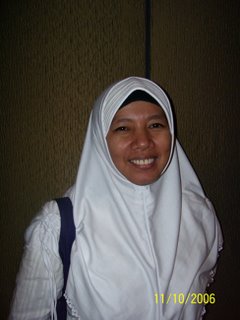 First published in The Jakarta Post, October 26, 2006
First published in The Jakarta Post, October 26, 2006YANTI SRIYULIANTI: PROMOTING AWARENESS OF EDUCATION
Alpha Amirrachman, Contributor, Jakarta
In 1999, Yanti Sriyulianti she was accepted as a volunteer as a staff in the learning resource division at a private elementary school where her daughter also studied.
“Relations between teachers and parents were conducive, with parents enthusiastically involved in providing alternative solutions to almost every school problem.
“Problems of lack of books, class facilities, laboratorium and parking lot were resolved amicably and effectively,” she told The Jakarta Post recently.
However, that did not last long. The new management of the school foundation seemed to begin to see the parents as interfering in school affairs.
No reasonable reasons were actually provided, but “it was enough to make me feel disillusioned of what I had expected to be the nurturing democracy of school,” she said.
In fact, many school committees have become a rubber stamp of the school management, both in private and public schools.
Yanti later gathered several concerned families of the school to have regular meetings at the home of one of the school founders, who threw his support behind their efforts.
They discussed a wide range of issues from experience in educating their children to government education policy. As the gathering grew larger with more families from different schools joining, they named their forum KerLIP (Family Forum Concerned with Education) on Dec. 25, 1999, with Yanti becoming its General Secretary.
KerLIP soon became a critical parent forum that is concerned with the democratization of education. It developed a wide range of activities such as providing financial aid to schools, developing student creativity by holding drawing competition, conducting story-telling training, opening weekend classes for students with disabilities, setting up libraries for low-income families, conducting research of the development of “liberating education”—an education concept that liberates students from rigid and bureaucratic learning atmosphere.
KerLIP implemented the concept in 2001 at Hikmah Pelajar elementary school in Cimahi, West Java.
“Children have special characteristics of being sensitive, curious, creative and imaginative. We should be able to nurture these positive characteristics and making use of them during their learning process,” said Yanti, who has now been KerLIP’s chairwoman since 2004.
However, present education system prevents students from being creative and imaginative, she said.
“For example, the infamous Natonal Exams (UN) which are the only consideration of whether students pass is unfair, because it overlooks students’ learning process during years of learning,” she said.
There are only three core subjects being tested. And if a student fails just one of the three subjetcs, he or she will fail the entire exam and will have to repeat the whole year.
“Do you think that is fair?” she challenged. “How can you force someone who is a genius in Math to be also a genius in English?”
It is because of this that Yanti and his colleagues began helping students who have failed the national exams. In cooperation with LBH Jakarta and other concerned parties, KerLIP conducted various demonstrations and began advocating for the students.
But the challenges are huge and the government refused to bow to the pressure.
Yanti is still optimistic, “We’ll continue the fight,” she vowed, confident that the public is behind the efforts.
Born on July 10, 1969 in Bandung, Yanti was a pharmacy student at the Faculty of Math and Science at Bandung Institute of Technology. Her own experiences made her determined to make sure that every child’s right to decent education is ensured, as guaranteed in the Child Protection Law: ”Every child is entitled to earning education and teaching to develop her/his personality as in line with the level of her/his intellectuality and interests.”
Yanti has held various positions. She has participated in Education Network for Justice in association with the Asia Pacific Bureau Adult Education (ASPBAE). She has been involved in activities to ensure that particularly marginalized women can enjoy cheap and quality education.
This includes research on privatization on education; analysis on educational budget at national, provincial and local levels, national workshop and a study in West Nusa Tenggara; development of benchmarks of quality education at local levels with a pilot study conducted in Sumatera; and strengthening the national network between working groups that advocate for alternative education.
She was a program manager for the Action and Advocation Program for internally displaced women, especially women in illiteracy, and internally displaced children, disabilities and marginalized children in Aceh Province.
She also designed and developed programs of budgeting of school-based management in a number of schools, such as Darul Hikmah di Cimahi, SD Hikmah Teladan, and three schools in Garut, Tasikmalaya and Ciamis.
KerLIP has also initiated a home-schooling program, which has gradually mushroomed in Jakarta, Bandung, Medan, Surabaya and Sukabumi.
“Some doubt about the effectiveness of home-schooling, but success stories in many countries such as in the U.S. are evident,” Yanti said.
She added that the daughters of Indonesia’s high-flying educationalist Kak Seto pursued home-schooling and one of them has already been accepted in a foreign university.
She said that home-schooling is a legal practice as families pursuing home-schooling would just need to report to local Education Office if they would like to receive equalization recognition through special exams.
“One research shows that home-schooling would develop a pattern of family communication that is dynamic and full of love, warmth and liberty for a life-long learning,” said Yanti, whose one of her three children is also now pursuing home-schooling.
Asked about the challenges, she said, “Many are still only familiar with conventional education with a class, a blackboard, a teacher, and an often uncompromising curriculum. However, when we feel that our children are trapped in an education bureaucracy that prevents their creativity and liberty, family-based education could serve as an alternative.”
No comments:
Post a Comment